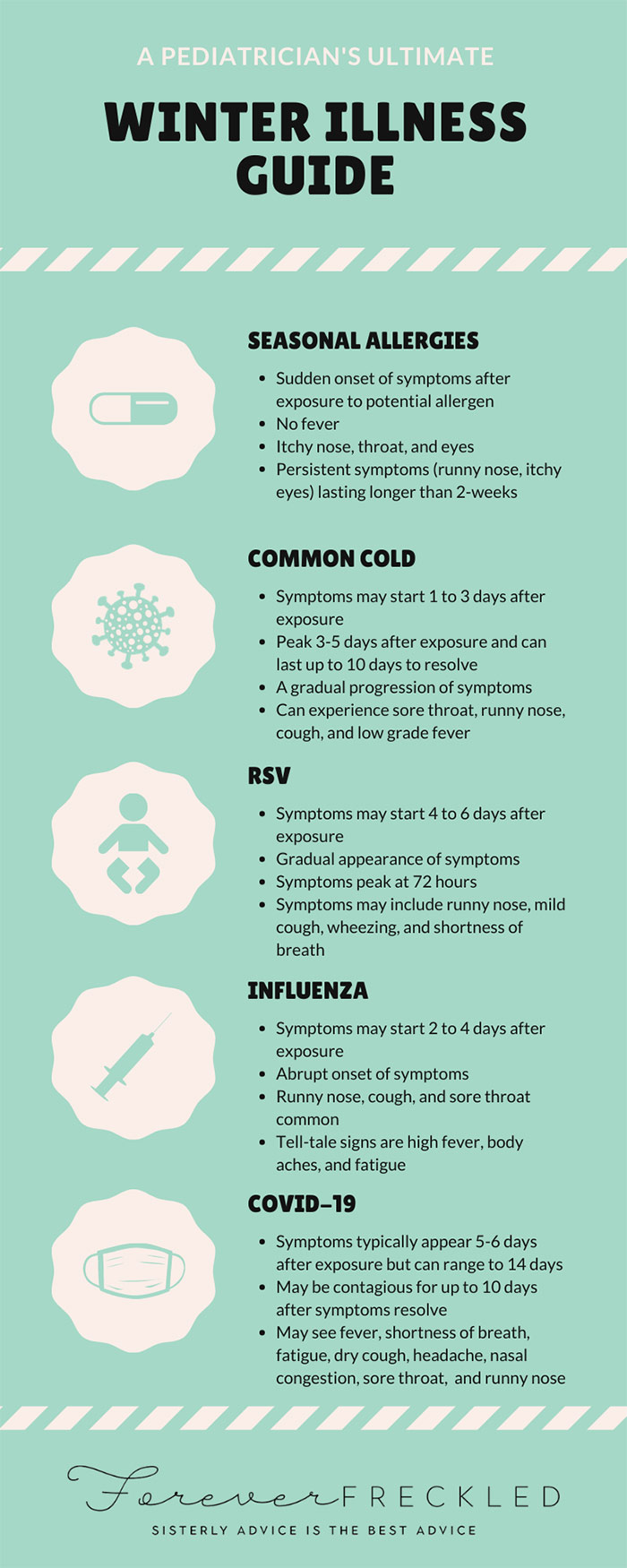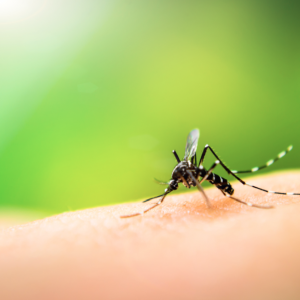
A Pediatrician’s Ultimate Winter Illness Guide
As we put away our bathing suits and tank tops and get out the sweaters and coats, you might want to also break out the tissues and humidifiers for the runny nose and sore throat symptoms to come.
The winter season is typically the season of upper respiratory infections. Whether just a common cold or the flu, thousands and thousands of families will struggle this winter with stuffy noses and other horrible symptoms.
As we enter the winter months, parents have many fears and uncertainties during an already scary and unpredictable pandemic. Over the last nearly 2 years, parents have been faced with the scary unknown of whether their child’s cough is just a mild cold or COVID-19.
Although it is impossible to know for sure what virus your child has without a proper evaluation from a pediatrician and diagnostic tests, today I want to break down the common culprits when it comes to winter ailments and their specific characteristics.
Be on the Lookout for 5 Winter Illnesses in Kids
The fall and winter months usually bring several respiratory viruses and other potential illnesses, making it very difficult to tell what your child actually has.
In general, the common cold tends to occur more gradually and doesn’t result in high fever or shortness of breath. On the other hand, RSV does typically cause a high fever. And then seasonal allergies present with no fever at all.
Unfortunately, COVID-19 and influenza share many of the same symptoms. Hence why it is more important than ever to have your child evaluated immediately if they do develop a fever.
So let’s get started with breaking down the common signs and symptoms of 5 winter illnesses! And know when to seek your pediatrician’s advice.
1. Seasonal Allergies
Colds and seasonal allergies share a lot of the same symptoms. However, there are a few differentiating features that help narrow down a diagnosis.
Seasonal allergies almost never cause a fever. Also, ongoing symptoms beyond a 2-week timeframe may indicate your little one is dealing with seasonal allergies. Itchy eyes and noses are a good indicator for allergies, whereas colds tend to cause watery eyes and sore throats.
Exposure to allergens can trigger symptoms quickly. With seasonal allergies, your child may be outside playing and suddenly develop a runny nose and itchy eyes when they had no symptoms previously.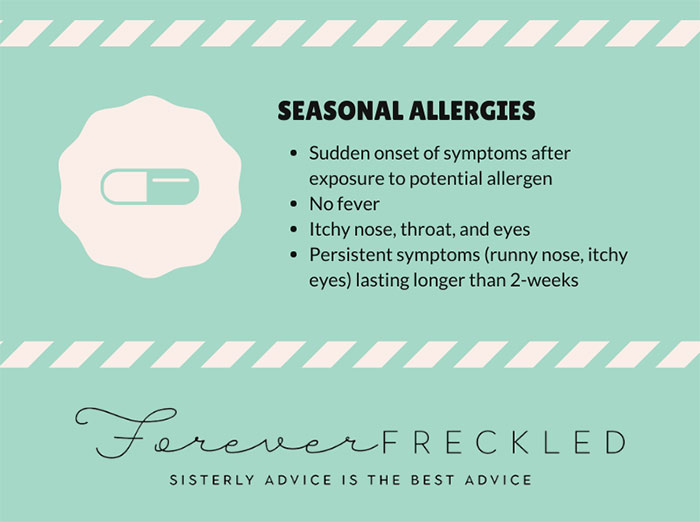
2. Common Cold
The common cold is one of the most common illnesses in children during the winter months. The winter season is all about runny noses and horrible coughs. Rhinovirus is the most common cause of cold-like symptoms.
The winter months are our busiest months in the emergency room as we see a huge surge of upper respiratory infections.
Unlike with the flu, a common cold usually results in a gradual progression of symptoms. Those symptoms can include sore throat, runny nose, cough, and low-grade fever. The symptoms typically peak 3 to 5 days into the virus and takes 7-10 days to completely resolve.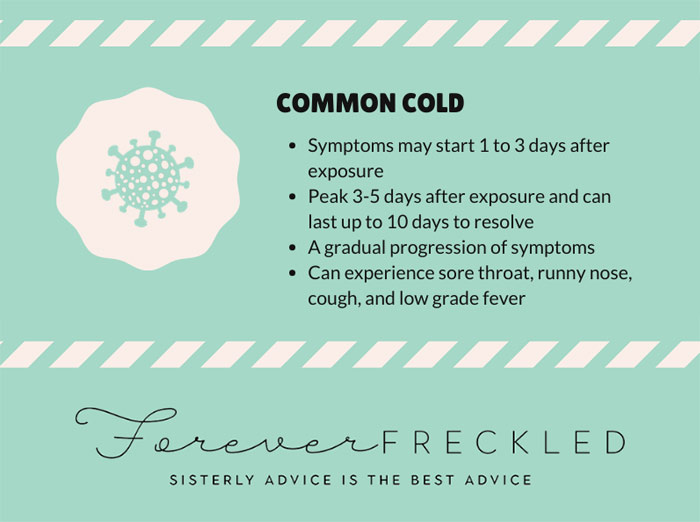
3. RSV
Respiratory syncytial virus, also known as RSV, is the leading cause of bronchiolitis (inflammation of the small airways in the lung) in children younger than 1 year of age in the United States.
This respiratory virus can cause symptoms ranging from runny nose and mild cough to more serious respiratory symptoms, including difficulty breathing and shortness of breath. Newborns and infants are at higher risk for developing wheezing and dehydration if they become sick with RSV.
Most cases can be managed at home with the help of your pediatrician. But it is important to have your child evaluated to assess the severity of the illness and if any intervention is necessary. The best way to prevent your child from getting RSV is to practice good hand washing hygiene and cleaning contaminated surfaces.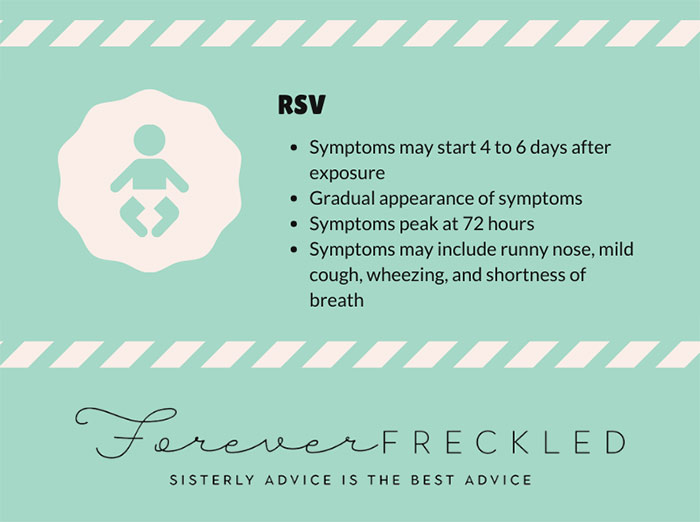
4. Influenza
The flu, also know as influenza, is caused by a virus that infects the respiratory system. Unlike other viruses that cause cold-like symptoms, the flu can cause severe illness and have life threatening complications. Along with runny nose, cough, and sore throat, influenza also causes high fever, muscle aches, and extreme fatigue. It is estimated that 5 to 20% of the United States’ population will suffer from the flu and over 200,000 people will be hospitalized due to complications from the flu.
Unlike with the common cold, we do have a medication to help shorten the duration of the virus. However, it must be started within the first 24-48 hours of symptoms in order for it to help. A delay in treatment increases the risk of serious influenza-related complications for your child and any other high-risk household members. It’s also important to think about your entire family unit when considering early intervention.
Due to the pandemic, now is the time to be proactive with preventative measures. The annual flu shot is still the best way to protect your family from this virus!
5. COVID-19
The most common symptoms associated with COVID and kids are fever, dry cough, and shortness of breath. Although these are the most common symptoms, the symptoms will vary from person-to-person. Other symptoms people are experiencing are body aches, fatigue, headache, runny nose, sore throat, and diarrhea.
Although children do experience similar symptoms as adults, their symptoms tend to be more mild. If there are other members in your household who are considered high risk for COVID-19, watching for these mild symptoms is more important.
If you suspect your child has symptoms consistent with COVID-19, call your doctor immediately. Set up either a telemedicine appointment or an office visit as soon as possible.
With children physically back in school, early detection and contact tracing of COVID-19 is imperative and can save lives.
The good news this winter season is that the Pfizer-BioNTech vaccine was just approved for children ages 5-11!
The best ways to prevent contracting and spreading COVID-19 are to get vaccinated and to continue practicing social distancing measures, masking, and hand washing hygiene.
Final Thoughts on Winter Illnesses in Children
You will always be your child’s biggest advocate! If you are worried about your child’s symptoms, your pediatrician is the perfect resource. Your pediatrician is always there to help answer any questions or address any concerns you may have.
Whether your child has influenza, COVID-19, or another respiratory illness, early testing and treatment, if available, is important for your child, your whole family, and your community.
~Dr. Katie